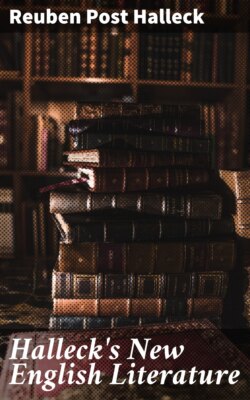Читать книгу Halleck's New English Literature - Reuben Post Halleck - Страница 18
На сайте Литреса книга снята с продажи.
SUMMARY
ОглавлениеThe Anglo-Saxons, a branch of the Teutonic race, made permanent settlements in England about the middle of the fifth century A.D. Like modern German, their language is highly inflected. The most flourishing period of Anglo-Saxon poetry was between 650 and 825 A.D. It was produced for the most part in the north of England, which was overrun by the Danes about 800. These marauders destroyed many of the monasteries and silenced the voices of the singers. The prose was written chiefly in the south of England after the greatest poetic masterpieces had been produced. The Norman Conquest of England, beginning in 1066, brought the period to a close.
Among the poems of this age, we may emphasize: (1) the shorter scopic pieces, of which the Far Traveler, The Wanderer, The Seafarer, The Fortunes of Men, and The Battle of Brunanburh are important examples; (2) Beowulf, the greatest Anglo-Saxon epic poem, which describes the deeds of an unselfish hero, shows how the ancestors of the English lived and died, and reveals the elemental ideals of the race; (3) the Caedmonian Cycle of scriptural paraphrases, some of which have Miltonic qualities; and (4) the Cynewulf Cycle, which has the most variety and lyrical excellence. Both of these Cycles show how the introduction of Christianity affected poetry.
The subject matter of the poetry is principally war, the sea, and religion. The martial spirit and love of the sea are typical of the nation that has raised her flag in every clime. The chief qualities of the poetry are earnestness, somberness, and strength, rather than delicacy of touch, exuberance of imagination, or artistic adornment.
The golden period of prose coincides in large measure with Alfred's reign, 871–901, and he is the greatest prose writer. His translations of Latin works to serve as textbooks for his people contain excellent additions by him. AElfric, a tenth century prose writer, has left a collection of sermons, called Homilies, and an interesting Colloquium, which throws strong lights on the social life of the time. The Anglo-Saxon Chronicle is an important record of contemporaneous events for the historian.
